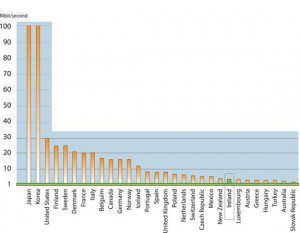The MKCREATIVE blog has posted on issues of net neutrality, network infrastructures, and the impending Google gigabit network for some fortunate community in these United States. So our antennae were twitching as the decision/appeal concerning the FCC’s statute of ‘net neutrality.’ And the court has decided that the FCC’s statutes are unconstitutional. Here is a nice introduction from The Wall Street Journal (including the fact that the pundits interviewed do not expect the Obama Administration to spend political capital appealing the appeal:
Of course, the issue is not resolved (any more than health care is ‘resolved’).
Wired Magazine’s Ryan Singel posited a world in which the broadband companies (some of whom are your cable and phone companies as well, don’t forget) dictate the router you use or the search engine you may use:
Now broadband companies effectively have no regulations that constrain them, as the FCC has left itself with no statutory means to control what telecoms do with their internet networks.
A broadband company could, for instance, ink a deal with Microsoft to transfer all attempts to reach Google.com to Bing.com. The only recourse a user would have, under the ruling, would be to switch to a different provider — assuming, of course, they had an alternative to switch to.
Companies can also now prohibit you from using a wireless router you bought at the store, forcing you to use one they rent out — just as they do with cable boxes. They could also decide to charge you a fee every time you upgrade your computer, or even block you from using certain models, just as the nation’s mobile phone carriers do today.
Daniel Indiviglio of The Atlantic blog sees a less dictatorial regime emerging, as providers demand higher payment for those who use more of the infrastructure, which could help defray costs to poorer constituents, whose demands on bandwidth are (presumably) lower.
Asserting the Internet should remain open and unrestrained isn’t the same as saying service providers shouldn’t have any control over their own networks. They have a business to run, and as long as they don’t arbitrarily or unfairly discriminate among various users or websites, but do so based on the cost the traffic imposes, then such mild limits to net neutrality actually would benefit the average user in the long run.
A couple of months ago we posted a blog concerning Google’s move to become the first ISP (Internet Service Provider) to offer a 1gigabit/second network to one city as a proof-of-concept. We wondered if Google were doing so precisely because its board and/or engineers saw the possibility of a non-neutral internet. Perhaps Yahoo! or Microsoft will pay to have our searches steered toward their services (and away from Google’s).
In our opinion, what makes the ruling unnerving is the open-ended possibility that one’s ISP is now free to redirect or ratchet-down your service before its PR phone calls start asking you if you wouldn’t love an upgrade for only an extra $x per month. And who doesn’t love an upgrade, even if it ends up being an ‘upgrade’ back to the 1990s speeds of DSL? Surely some in the ISP community (and we stress that not all ISPs are evil law-school graduates – pardon the redundancy) have learned the tricks of the credit card industry: turn a service into a ‘premium’ and offer it for a nominal charge.
That said, the FCC can not merely walk away from its mandate. Congresspeople are already discussing the fact that an end to net neutrality does not mean ISPs can call all the shots. Perhaps a reasonable balance can be achieved with a free market encouraging profit and innovation yet carefully watched by a disinterested governing body from egregious abuses.
No, really.

